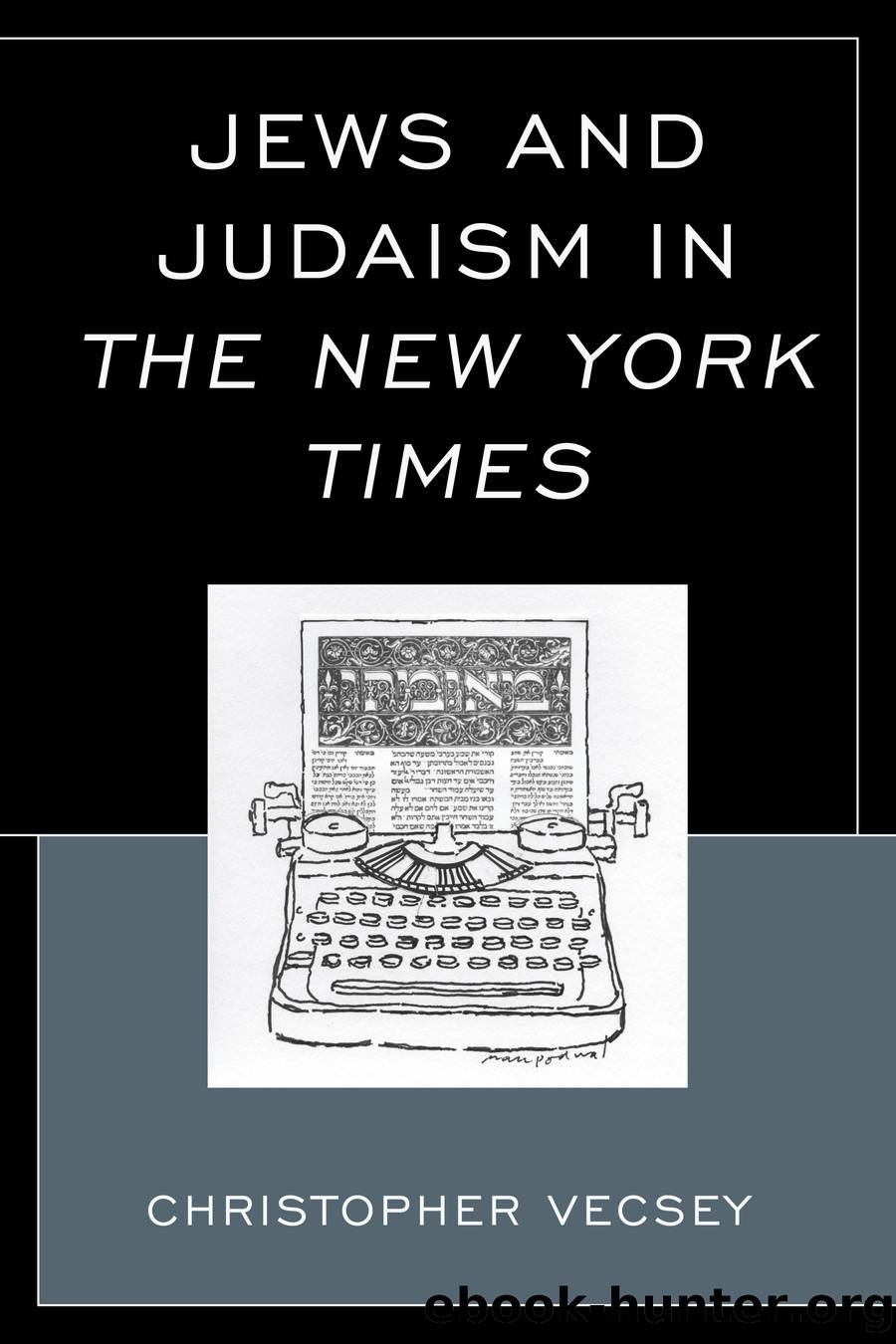Jews and Judaism in the New York Times by Vecsey Christopher;

Author:Vecsey, Christopher;
Language: eng
Format: epub
Tags: undefined
Publisher: Lexington Books/Fortress Academic
Published: 2012-08-15T00:00:00+00:00
Fascination
Another type of revisionism took place, beginning in the 1980s. By then a veritable ââHolocaust industryââ (Hyman September 14, 1980) had developed. The Holocaust had become âmarketableâ since the mid-1970s, in an âexplosion of Holocaust-related materialâ available for popular consumption: books, films, news reports, conferences, lecture series, museum exhibitions, and so on. Hundreds of college courses examined the Holocaust and a Presidentâs Commission on the Holocaust recognized the need in the United States to memorialize Nazi atrocities, particularly to the Jews. Holocaust museums took shapeâin New York City, Washington, D.C., Los Angeles, and elsewhereânot only to document âthe horror of the Holocaust but also to portray the vitality and variety of Jewish life, which the Holocaust nearly extinguished, as well as the renewal of Jewish faith and traditionsâ in many lands (McGill March 7, 1988; see Goldman January 29, 1989). Eight state curriculums mandated Holocaust studies for high school students (Berger October 3, 1988). By 1990, one could consult a âmonumentalâ (Shepard May 3, 1990), four-volume Encyclopedia of the Holocaust, from A to Zyklon B, or peruse âthe definitive popularizationâ (Sanders November 4, 1990) of âthe most enormous tragedy in human history.â
Elie Wiesel, whose memoir, Night, had opened the way for an American encounter with the Nazi death camps, worried that âthe proliferation of sensationalized books and popularized television programs and films has dishonored the victims and rendered the public insensitive to the tragedyâ (Hyman September 14, 1980). Other Jewish critics, like Arnold Jacob Wolf and Jacob Neusner, cautioned American Jews against too much âpassionate interestâ in the Holocaust, for the barriers it might erect to âhealthy intergroup relationsâ with non-Jews, and the âvicariousnessâ it might give to American Jewish âidentity.â ââThe turning of the murder of European Jewry into a paramount symbol of what it means to be a Jew,ââ Neusner said, ââpresents altogether too simple and too repulsive an account of reality.ââ Furthermore, it was said, focus on the Holocaust served to deflect criticism of the âlegitimacy of current Israeli Government policy.â
The Times gave voice to these critics, and to those who decried an exclusive focus on the suffering of Jews in Nazi concentration camps, to the exclusion of non-Jewish victims, such as Communists, Gypsies, or homosexuals. A sociologist reproached such a focus, calling it âJewish triumphalism and a reworking in secular terms of the concept of the âchosen people.ââ Even recognizing the special Nazi policies to annihilate Jews, members of the Presidentâs Commission said âThe appropriate Jewish response to Nazi persecution must be a heightened vigilance to all human suffering.â Wiesel agreed that Holocaust studies should make learners ââmore compassionate, and more passionate for learning,ââ and he feared that a âsaturation point has been reached, whether mention of the Holocaust produces only apathy.â Nonetheless, he denounced the denial of âspecial status of the Jews as victims of Nazi persecution. . . . âThey are stealing the Holocaust from us,ââ he said, and ââthis is exactly what the Germans wanted to accomplish, to erase the memory of the Jewish people.
Download
This site does not store any files on its server. We only index and link to content provided by other sites. Please contact the content providers to delete copyright contents if any and email us, we'll remove relevant links or contents immediately.
Asking the Right Questions: A Guide to Critical Thinking by M. Neil Browne & Stuart M. Keeley(5338)
Autoboyography by Christina Lauren(5078)
Dialogue by Robert McKee(4146)
Eat That Frog! by Brian Tracy(4129)
Sticky Fingers by Joe Hagan(3898)
Journeys Out of the Body by Robert Monroe(3444)
Annapurna by Maurice Herzog(3281)
Full Circle by Michael Palin(3261)
Elements of Style 2017 by Richard De A'Morelli(3228)
Schaum's Quick Guide to Writing Great Short Stories by Margaret Lucke(3175)
The Art of Dramatic Writing: Its Basis in the Creative Interpretation of Human Motives by Egri Lajos(2843)
The Diviners by Libba Bray(2788)
Why I Write by George Orwell(2762)
The Mental Game of Writing: How to Overcome Obstacles, Stay Creative and Productive, and Free Your Mind for Success by James Scott Bell(2754)
In Patagonia by Bruce Chatwin(2748)
Atlas Obscura by Joshua Foer(2697)
The Fight by Norman Mailer(2678)
Venice by Jan Morris(2417)
The Elements of Style by William Strunk and E. B. White(2367)
